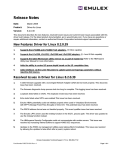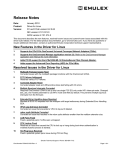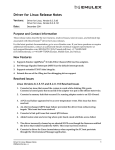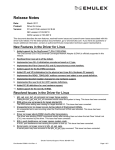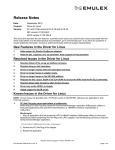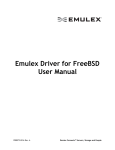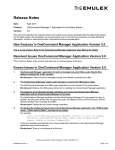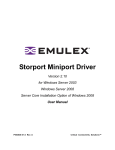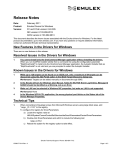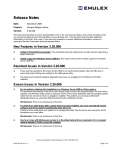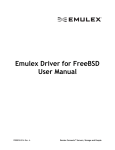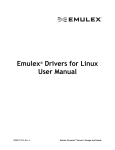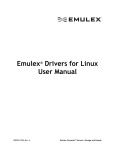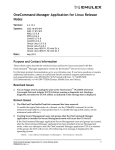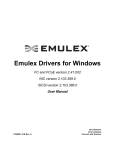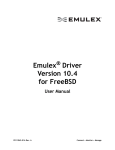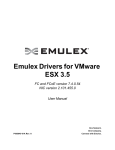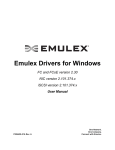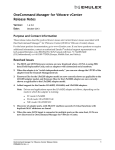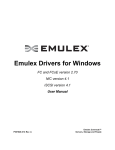Download Release Notes
Transcript
Release Notes Date: Product: Version: March 2010 Driver for Linux FC and FCoE version 8.2.0.66 NIC version 2.101.462.0 iSCSI version 2.101.462.0 This document describes the new features, resolved known issues and current known issues associated with this driver build release. For the latest product documentation, go to www.Emulex.com. If you have any questions or require additional information, contact an authorized Emulex Corporation technical support representative. Note: The Emulex Driver for Linux User Manual, which supports FC and FCoE version 8.2.0.63, NIC version 2.101.374.0, and iSCSI version 2.101.374.0 drivers, also supports FC and FCoE version 8.2.0.66, NIC version 2.101.462.0, and iSCSI version 2.101.462.0 drivers. These release notes cover differences between the versions. New Features in the Driver for Linux 1. Supports the OCe1110x-x OneConnect Universal Converged Network Adapters (UCNA) BE3 architecture. Resolved Issues in the Driver for Linux 1. Added the capability for displaying the Quality of Service (QOS) link speed. 2. Resolved issues for an Nport ID change after a Clear Virtual Link operation. Corrected the issue that the driver does not support NPort ID change after a CVL. 3. Removed checking for class specific parameters for a fabric login (FLOGI). Addressed a direct connect issue with the LTO5 tape drive. 4. Added init_vpi mailbox command before re-registering a virtual path identifier (VPI). Corrected an issue where registering a VPI after an NPortID change of a vport failed with status 0x20. Known Issues in the Driver for Linux 1. PCI Hot Plug may cause applications to malfunction. Performing a PCI Hot Plug may cause the HBAnyware utilities or third party applications that use the Emulex libraries (i.e. HBAAPI) to behave unpredictably or malfunction. Workaround: 1. Stop all applications that are accessing LPFC's HBAAPI interface (HBAnyware utilities or third party applications) before performing PCI Hot Plug of an LPFC HBA. Use the following command to stop the HBAnyware application: #/usr/sbin/hbanyware/stop_hbanyware 2. Perform the PCI Hot Plug of the HBA. 3. Restart the application. 2. Deleting virtual ports or performing a PCI Hot Unplug may result in SCSI errors. When you delete a virtual port via the sysfs interface or perform a PCI Hot Unplug of an Emulex HBA, the kernel may report one of the following errors: kernel: Synchronizing SCSI cache for disk kernel: FAILED or SCSI error: return code = 0x00010000. Emulex Technical Support / Phone: 800-854-7112 Part Number P005452-01A Rev. A Page 1 of 3 3. 4. Workaround: These messages do not indicate a functional failure and can be ignored. LILO Boot Loader is not supported for i386 and x86_64 architectures. The LILO Boot Loader on i386 and x86_64 architectures is not supported for this driver stream. After the LILO boot loader is used, the LPFC driver package is installed and upon a reboot, an incorrect initial ramdisk will be used. The system might not boot correctly. Workaround: Use the GRUB Boot Loader. GRUB works correctly with the driver package's installation script GRUB is the default boot loader of most of the Linux distributions. LILO is an older boot loader used on i386 and x86_64 architectures only. Issue with the LPFC module order in the INITRD_MODULES list. On the SLES10 system, if another SCSI driver such as aic79xx, is loaded immediately after the LPFC driver through the initrd image, an interruption might occur in the SCSI mid-layer discovery process on the LUNs connected to LPFC’s Fibre Channel. This interruption can prevent the release of the SCSI discovery reference count and the LPFC driver cannot unload. Workaround: Do not add SCSI drivers immediately after the LPFC module in the INITRD_MODULES list. 5 The “Suspend to Disk and Resume Support” feature is not supported in the LPFC driver. If you attempt to suspend to disk using the command “#echo disk > /sys/power/state”, the LPFC driver encounters a kernel Oops. Workaround: There is no workaround at this time. The sysfs parameter "/sys/power/state" is used to suspend and resume the system. The LPFC driver does not support this sysfs parameter. Do not attempt to use this sysfs parameter when the LPFC driver is loaded 6. Deleted virtual ports may appear to be mounted, but are inaccessible. While Emulex provides management utilities to enable you to delete virtual ports, the LPFC driver cannot detect whether devices accessed through a virtual port are in use. You can delete a virtual port even when devices accessible through the virtual port are mounted or when I/O is outstanding to the device. If file systems are mounted on a virtual port and that virtual port is deleted, the file systems still appear to be mounted but are not be accessible. Workaround: Before deleting virtual ports, prepare the system affected by unmounting all the devices accessible through the virtual ports, and verifying that there is no outstanding I/O. 7. 4 Gb/s HBAs in virtualized environments that use Direct I/O or SFPT do not initialize. Default driver configuration fails to initialize 4 Gb/s HBAs in virtualized environments that use Direct I/O or SFPT(Storage Fixed Pass through) .This may result in a system hang or uninitialized LPFC HBA in Intel VT-d and AMD-V IOMMU systems. Workaround: Load the LPFC driver with the following driver parameters set: lpfc_hostmem_hgp=1 lpfc_sli_mode=2 For example: # modprobe lpfc lpfc_hostmem=1 lpfc_sli_mode=2 Note: A side effect of this workaround is that virtual ports are no longer be supported by the LPFC driver when lpfc_sli_mode is set to 2. 8. Potential error messages when removing the driver kit. The driver kit removal process uses the "lpfc-install -u" command. The previous in-box LPFC driver version was saved as part of the driver kit install process. The "lpfc-install -u" restores and activates the in-box LPFC driver. However, the driver kit uninstallation process does not remove any entries in the Linux distribution configuration file (modprobe.conf). As such, parameters that would have been valid for the just-removed driver version and entered in the modprobe.conf file, are also used to load the justrestored in-box driver version. This can create problems if these two conditions exist: • The just-removed driver version includes module parameters that did not exist in the older justrestored driver version, and Emulex Technical Support / Phone: 800-854-7112 Part Number P005452-01A Rev. A Page 2 of 3 • One or more of these module parameters are included in the configuration file (modprobe.conf). Errors appear similar to the following: Loading LPFC Driver .FATAL: Error inserting lpfc (/lib/modules/<kernel_revision>/kernel/drivers/scsi/lpfc/lpfc.ko): Unknown symbol in module, or unknown parameter (see dmesg) Workaround: Remove all entries in the Linux configuration file (modprobe.conf) that list the LPFC driver module parameters, that is entries that begin with: options lpfc ... Then uninstall the driver kit. Note: To find the module parameters supported by a LPFC driver module, run the following command: # modinfo <driver_dir>/lpfc.ko 9. LPe12000 HBA may be identified as an "Unknown Device". On RHEL5 and SLES10-SP1 distribution kernels, the output of the Linux distribution lspci utility incorrectly identifies the LPe12000 HBA as an "Unknown device". Example: 0b:00.0 Fibre Channel: Emulex Corporation Unknown device f100 (rev 01) Workaround: There is no workaround at this time. The Linux distribution lspci utility on RHEL5 and SLES10-SP1 distribution kernels do not yet recognize the LPe12000 HBA. Copyright © 2003-2010 Emulex. All rights reserved worldwide. No part of this document may be reproduced by any means or translated to any electronic medium without the prior written consent of Emulex. Information furnished by Emulex is believed to be accurate and reliable. However, no responsibility is assumed by Emulex for its use; or for any infringements of patents or other rights of third parties which may result from its use. No license is granted by implication or otherwise under any patent, copyright or related rights of Emulex. Emulex, the Emulex logo, AutoPilot Installer, AutoPilot Manager, BlockGuard, Connectivity Continuum, Convergenomics, Emulex Connect, Emulex Secure, EZPilot, FibreSpy, HBAnyware, InSpeed, LightPulse, MultiPulse, OneCommand, OneConnect, One Network. One Company., SBOD, SLI, and VEngine are trademarks of Emulex. All other brand or product names referenced herein are trademarks or registered trademarks of their respective companies or organizations. Emulex provides this manual “as is” without any warranty of any kind, either expressed or implied, including but not limited to the implied warranties of merchantability or fitness for a particular purpose. Emulex may make improvements and changes to the product described in this manual at any time and without any notice. Emulex assumes no responsibility for its use, nor for any infringements of patents or other rights of third parties that may result. Periodic changes are made to information contained herein; although these changes will be incorporated into new editions of this manual, Emulex disclaims any undertaking to give notice of such changes. Emulex, 3333 Susan Street Costa Mesa, CA 92626 Emulex Technical Support / Phone: 800-854-7112 Part Number P005452-01A Rev. A Page 3 of 3



